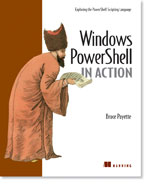/\/\o\/\/ PowerShelled
This blog has moved to http://ThePowerShellGuy.com Greetings /\/\o\/\/ $AtomFeed = ("Atom.xml")$PreviousItems = (" Tip from Monad "," MSH AD querying with .NET 2.0 framework "," get AD user allowed Logonhours from MSH "," MSH Show-Byte Function "," Let monad "drop" some chars "," getting an Inputbox in MOnad "," Get AD info into a nested HashTable from MSH "," Logging your MSH session "," MSH get-dateFormat function "," Working with a Path in MSH "," ")
Wednesday, December 07, 2005
Monad -and More bytes with -band = shorter script
For the script MSH Show-Byte Function , I found a much shorter solution yesterday :
MSH>$byte = 23Exept from the nicer layout, does does basicly the same, gives you the bits that are set in a byte.
MSH>for ($i=0;$i -lt 8;$i++){if ($byte -band [math]::pow(2,$i)) {"$i Set"} else {"$i"} }
0 Set
1 Set
2 Set
3
4 Set
5
6
7
so now it's also easy to make this script, to only 14 lines.
get AD user allowed Logonhours from MSH
Another thing you might notice is the $bits array is gone.
that's becouse I only made this workaround, because I forgot about this :
[math]::pow(2,0)
that's another thing I like about Monad it forces me to think about things I once did know but are now hidden in libraries and Past&Copy files.
so, it's not alway's is a bad thing to re-invent the weel.(as you might find a cheaper way to make it (shorter / easier), and refresh some old Math on the way. ;-) thx Markus
also nice is I think the way I came to use the Binary AND function.
It started like this :
MSH>(gi .) | gm
MSH>(gi .) | gm
TypeName: System.IO.DirectoryInfo
Name MemberType Definition
---- ---------- ----------
....
....
Mode ScriptProperty System.Object Mode {get=$catr = "";
then I did see the Mode script property, that got me thinking as this is a bin value also, let's look how it's done :
so I did :
MSH>(gi .) | gm | fl
....
.....
TypeName : System.IO.DirectoryInfo
Name : Mode
MemberType : ScriptProperty
Definition : System.Object Mode {get=$catr = "";
if ( $this.Attributes -band 16 ) { $catr += "d" } else { $catr += "z" };
if ( $this.Attributes -band 32 ) { $catr += "a" } else { $catr += "-" } ;
if ( $this.Attributes -band 1 ) { $catr += "r" } else { $catr += "-" } ;
if ( $this.Attributes -band 2 ) { $catr += "h" } else { $catr += "-" } ;
if ( $this.Attributes -band 4 ) { $catr += "s" } else { $catr += "-" } ;
$catr;}
then this in the Monad dir :
MSH>match-string "-band" *.txt
about_Comparison_operators.help.txt:148: -band bitwise and 10 -band 3 2
about_Comparison_operators.help.txt:151: When the -band is used to compare values, the compared bits must
about_where.help.txt:30: -band Bitwise and
about_where.help.txt:61: -band bitwise AND
and that got me to this remake of the scripts.
I think a nice example how Monad teaches you about itself.
to bad the drive-example, is gone to the host also, as it was also a nice example of this (see Tuning MSH in your Profile )
gr /\/\o\/\/
